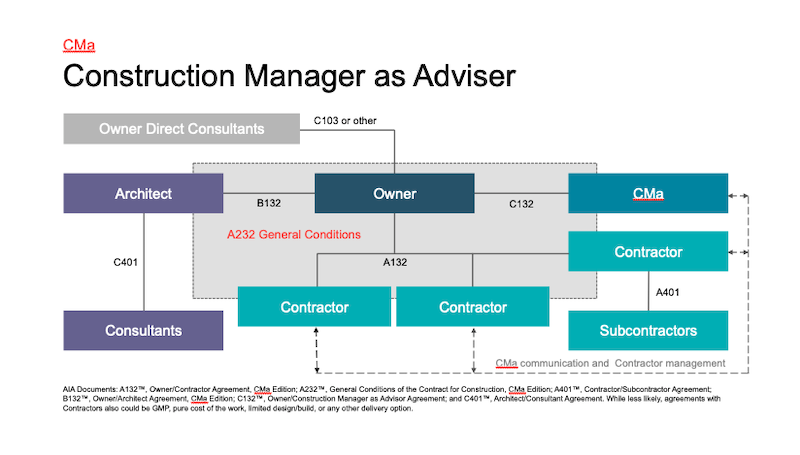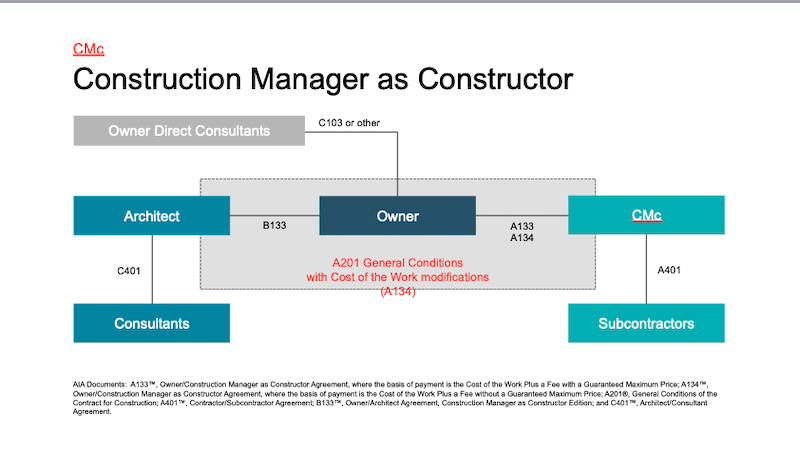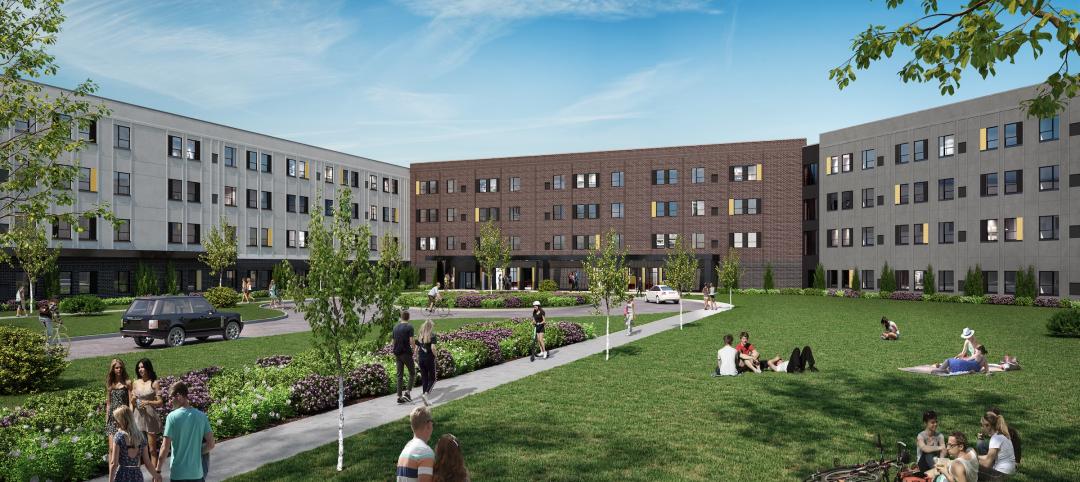On Nov. 15, the American Institute of Architects (AIA) plans to release its new and updated Construction Manager as Constructor (CMc) family of contract documents. Next February, the AIA will release its updated Construction Manager as Adviser (CMa) family of documents.
These documents get updated on a 10-year revision cycle.
The AIA divides its contract documents into nine families, organized by delivery method. These include families for design-bid-build (the most widely used contract model), design-build, and integrated project delivery, as well as contracts that specifically cover interiors, small projects, and digital practices. The design-bid-build document family was updated in 2017.
Under CMc, the Construction Manager comes on the project during the preconstruction phase to provide early collaboration. In the construction phase, the CM does the construction work, as if it were a General Contractor.
Under the CMa, the Construction Manager is also retained by the owner for early collaboration during the preconstruction phase. But the CMas don’t perform the construction work. The CMa documents are designed for complex projects with more than one prime contractor. During the construction phase, the CMa coordinates and manages the contractors, as well as providing cost estimating and other functions.
Susan Van Bell, Senior Director and Counsel – AIA Contract Documents Content, tells BD+C that the AIA solicited input from CM practitioners about revisions to the documents so that they’d better reflect current practices.
From those conversations, CMs suggested that one change they wanted was a way to tailor the document for the scope of preconstruction services without having the standard contract language be too restrictive.
Van Bell says the 2019 CMc revision addresses this issue by inserting “fill points” into the contract where more preconstruction details can be identified. The update also makes some edits to the standard preconstruction services scope.

A schematic of the family of documents for Construction Manager as Advisor.
The CMc documents now include insurance and bond exhibits, which had been added to the design-bid-build document family in its 2017 revision. Van Bell says there are also new exhibits for both the CMc and CMa documents that cover the role of the CM in sustainable projects.
The revised CMa documents clarify the CMa’s role in such areas as analyzing and coordinating the contractors’ schedules. The CMa is also the responsible party for managing a project’s digital information systems. “We clarified the communication process,” Van Bell says. The 2017 updates that required the establishment of protocols for digital data and BIM were carried into the CMc and CMa updates.
Related Stories
Student Housing | Jun 25, 2024
P3 student housing project with 176 units slated for Purdue University Fort Wayne
A public/private partnership will fund a four-story, 213,000 sf apartment complex on Purdue University Fort Wayne’s (PFW’s) North Campus in Fort Wayne, Indiana. The P3 entity was formed exclusively for this property.
Sustainability | Jun 24, 2024
CBRE to use Climate X platform to help clients calculate climate-related risks
CBRE will use risk analysis platform Climate X to provide climate risk data to commercial renters and property owners. The agreement will help clients calculate climate-related risks and return on investments for retrofits or acquisitions that can boost resiliency.
MFPRO+ News | Jun 24, 2024
‘Yes in God’s Backyard’ movement could create more affordable housing
The so-called “Yes in God’s Backyard” (YIGBY) movement, where houses of worship convert their properties to housing, could help alleviate the serious housing crisis affecting many communities around the country.
Student Housing | Jun 20, 2024
How student housing developments are evolving to meet new expectations
The days of uninspired dorm rooms with little more than a bed and a communal bathroom down the hall are long gone. Students increasingly seek inclusive design, communities to enhance learning and living, and a focus on wellness that encompasses everything from meditation spaces to mental health resources.
Museums | Jun 20, 2024
Connecticut’s Bruce Museum more than doubles its size with a 42,000-sf, three-floor addition
In Greenwich, Conn., the Bruce Museum, a multidisciplinary institution highlighting art, science, and history, has undergone a campus revitalization and expansion that more than doubles the museum’s size. Designed by EskewDumezRipple and built by Turner Construction, the project includes a 42,000-sf, three-floor addition as well as a comprehensive renovation of the 32,500-sf museum, which was originally built as a private home in the mid-19th century and expanded in the early 1990s.
Building Technology | Jun 18, 2024
Could ‘smart’ building facades heat and cool buildings?
A promising research project looks at the possibilities for thermoelectric systems to thermally condition buildings, writes Mahsa Farid Mohajer, Sustainable Building Analyst with Stantec.
University Buildings | Jun 18, 2024
UC Riverside’s new School of Medicine building supports team-based learning, showcases passive design strategies
The University of California, Riverside, School of Medicine has opened the 94,576-sf, five-floor Education Building II (EDII). Created by the design-build team of CO Architects and Hensel Phelps, the medical school’s new home supports team-based student learning, offers social spaces, and provides departmental offices for faculty and staff.
Mass Timber | Jun 17, 2024
British Columbia hospital features mass timber community hall
The Cowichan District Hospital Replacement Project in Duncan, British Columbia, features an expansive community hall featuring mass timber construction. The hall, designed to promote social interaction and connection to give patients, families, and staff a warm and welcoming environment, connects a Diagnostic and Treatment (“D&T”) Block and Inpatient Tower.
Codes | Jun 17, 2024
To avoid lawsuits, contractors and designers need to do more than comply with codes
Climate change is making design and construction more challenging and increasing the potential for lawsuits against building teams, according to insurance experts. Building to code is not enough to reduce liability because codes have not kept up with the rapid climate changes that are making extreme weather more common.
Concrete Technology | Jun 17, 2024
MIT researchers are working on a way to use concrete as an electric battery
Researchers at MIT have developed a concrete mixture that can store electrical energy. The researchers say the mixture of water, cement, and carbon black could be used for building foundations and street paving.

















